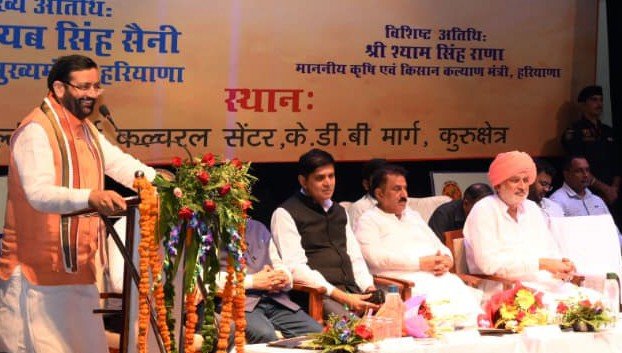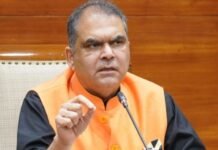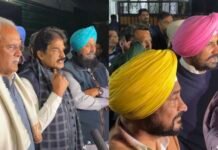Kurukshetra/Chandigarh, August 16 – Haryana Chief Minister Naib Singh Saini has rolled out a series of landmark announcements aimed at strengthening both the farming and trading communities in the state. Addressing farmers, beekeepers, and traders during programs in Kurukshetra and later in Chandigarh, the Chief Minister underlined the state government’s commitment to diversifying agriculture, increasing farmer income, and supporting businesses that contribute to Haryana’s development.
Saini announced that honey will now be included under the Bhavantar Bharpai Yojana, a move seen as a big relief for farmers and beekeepers. This decision, modeled on horticultural crops, ensures price compensation for honey producers. To facilitate smooth marketing, storage, and quality checks, honey will be sold through the Integrated Beekeeping Development Centre in Ramnagar, where a new Quality Control Laboratory will soon be established with an investment of ₹20 crore. The Ramnagar institute will also be upgraded into a national-level hub, enabling advanced research and innovation in beekeeping practices.
Highlighting the importance of honey production, the Chief Minister said that beekeeping has emerged as a profitable avenue for farmers, while also boosting crop yield. He emphasized that the initiative aligns with Prime Minister Narendra Modi’s vision of a “Sweet Revolution,” under which Haryana is taking rapid strides. Saini noted that by 2030, the state aims to train 7,750 beekeepers and achieve a honey production target of 15,500 metric tonnes. The state’s Beekeeping Policy-2021 is already offering up to 85 percent subsidy on bee boxes, colonies, and equipment, thereby empowering farmers to adopt modern apiculture practices.
Ramnagar’s Integrated Beekeeping Development Centre, established with Israeli collaboration, is the first of its kind in the country. The facility not only trains farmers but also provides access to honey processing, bottling, and trade. Over 74,000 bee boxes and more than 3.43 lakh comb sheets have already been distributed through the center, significantly boosting honey production. The Chief Minister added that beekeeping requires minimal land and can become a lucrative start-up option for women and youth. He urged young entrepreneurs to launch their own honey brands and explore online marketing opportunities to tap into global markets, assuring them of government support in both financial assistance and technical guidance.
While addressing the workshop, Saini pointed out that horticulture is becoming a cornerstone of agricultural diversification in Haryana. The state has witnessed a remarkable jump in horticulture area from 1.17 lakh acres in 2014 to 2.60 lakh acres today. Farmers are also being strengthened through Farmer Producer Organizations (FPOs), Centers of Excellence, procurement mechanisms, and schemes like Bhavantar Bharpai.
On the same day, the Chief Minister also reached out to the trading community with another major announcement. Responding to the long-pending demand of cottonseed (binola) traders, he declared that the one-time fee charged on binola machines will be reduced from ₹42,000 to ₹21,000. He reiterated that the state government stands shoulder-to-shoulder with traders who are key contributors to Haryana’s economic growth and promised that their concerns will always be addressed on priority.
During his interaction with members of the Haryana Oil Mills Association at the Multi Art Culture Centre in Kurukshetra, Saini was warmly welcomed by traders who honored him with a traditional turban. He assured them that the government is committed to creating a business-friendly environment and that every genuine issue faced by the trading fraternity will be resolved swiftly.
Agriculture and Farmers’ Welfare Minister Shyam Singh Rana, who also attended the events, said that enhancing farmer income remains the topmost priority of the government. He stressed that apart from crop production, allied sectors like dairy, fisheries, beekeeping, and horticulture are being promoted vigorously to ensure holistic rural prosperity. He added that when agriculture is backed by scientific innovation and robust security, the nation’s economy cannot be stopped from moving forward.
The events were also attended by former minister Subhash Sudha, Additional Principal Secretary to CM Dr. Saket Kumar, Agriculture Department Principal Secretary Pankaj Agarwal, Haryana Agricultural University Vice Chancellor B.R. Kamboj, Maharana Pratap Horticulture University Vice Chancellor Suresh Malhotra, Animal Control Board Chairman Dharamveer Singh Mirzapur, along with several departmental officers, beekeeping experts, and association representatives.
With these announcements, the Haryana government has sent a strong message of balancing farmer empowerment with business support, aiming at both agricultural transformation and economic progress. The integration of honey under price support, establishment of a national-level research hub, and the reduction of traders’ fees mark a dual focus on rural livelihoods and business ease, setting the stage for Haryana’s next phase of growth.




